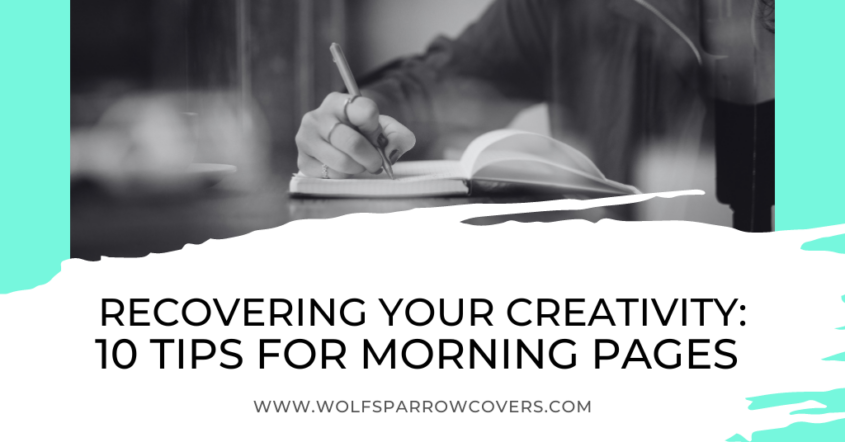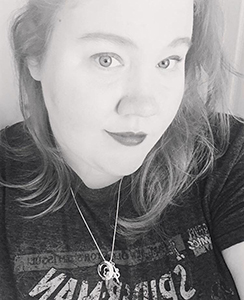Recovering Your Creativity: 10 Tips for Morning Pages

Morning pages are one of two foundational tools from Julia Cameron’s book The Artist’s Way. It’s a daily journaling practice consisting of three handwritten, stream of consciousness pages that have the goal of emptying our brain of clutter so our creativity can come alive again.
I’m currently running a group read-through of The Artist’s Way over at Wordmakers and wanted to share some tips for incorporating this tool into your life to help with the recovery of your creativity.
Tip 1: Make it Special
One way to motivate yourself to do these pages is to make your morning pages journaling a ritual. Make it a moment in your day where you pamper yourself a little. Use the good pen you’ve been saving for special occasions. Light a candle or some incense. Have some instrumental music or ambient noise going in the background. Grab that gorgeous leather-bound notebook off your shelf and stop hoarding it.
Whatever aesthetic inspires you, use that to motivate yourself. For me, I love being cozy so I hygge things up. Engaging your senses helps ground you in the moment. Make this a special time with yourself. You’re worth it. You’re worth investing in. Your creativity is worth investing in. Tap into that main character energy.
Tip 2: Treat Morning Pages like a Priority
This piggybacks on the above tip. In a world that constantly tells us to go-go-go and that our creativity is meaningless (looking at you, AI), making the time to devote to yourself is a middle finger to all that. It’s stopping all that noise and saying ENOUGH. I matter. My creativity matters. I am worth the time devoted to this pursuit.
If all you can manage to get out is one page rather than the three Julia asks for, that’s okay. I’m on the side of progress not perfection. But schedule yourself some time that’s yours. And guard it fiercely. Even if it’s only ten minutes.
Another way to free up some time could be to prep for your next day the night before. Lay out your work clothes. Make sure everything you need for your coffee is washed and ready right beside the machine. And so on. This will keep you from having to do all that in the morning. (Also, include setting out your notebook and pen as part of this process. If you have to hunt for them in the morning, that’s just another hurdle to overcome.)
Tip 3: Be a Rebel
During our group reading of The Artist’s Way, a few members are doing their morning pages at night and found this worked a lot better for them. Science backs this up. Making lists at night actually helps you sleep better because you’re offloading your worries rather than ruminating on them.
Now, I know what you’re thinking, “But T, a list isn’t journaling!” And you’d be wrong. Your “morning” pages can be anything you want it to be. Freethought. A little comic strip. Word vomit. Even a bulleted list. The point of the exercise is simply to empty out your brain so it can calm down and be open to creativity, be open to be inspired.
So, if journaling in the morning isn’t helpful for you and your life situation because we each are unique, try doing it at night and see what happens. Maybe your dreams awaken with the increase in better sleep and get up every morning with new ideas!
Tip 4: Start Small
Rome was not built in a day, as the old adage says. And to someone who has never journaled before (or for whom it usually doesn’t work), three full pages every single day is a lot. It’s very easy to become daunted or overwhelmed. So start small.
Give yourself 5-10 minutes at first, even if that only gets you one page or causes the journaling to be more list-form than freethought stream-of-consciousness. That’s okay. Don’t let this practice keep you from recovering your creativity. Just mold it to suit where you are now and build up from there, perhaps adding an extra minute each time to see what happens.
Tip 5: Add it to an Existing Habit
Take a look at your mornings (or evenings) now. What do you usually do? What could you add your morning pages to so it doesn’t seem like a new task (and therefore not as daunting)? Maybe those 3-4 minutes it takes for the kettle to boil or the coffee to brew, you can use to empty out some of the gunk in your brain. Maybe instead of watching TV while you eat your breakfast, you can journal a little.
Or, use it to replace a bad habit. I’m guilty of being someone who rolls over every morning and immediately reaches for my phone and ends up on social media for an hour and I’m often left in a shitty mood because of it… so I’m definitely not casting judgment here. I definitely fill my brain with worries and angry thoughts from other people on the regular.
But what if you placed your phone farther away from you and put your notebook on your nightstand instead? What might this change in your life, this one simple step?
Tip 6: Use a Tracker
I don’t care what anyone says, inside us all is still that little kid who wants gold stars to show their progress. Feed that inner child (which is one thing Julia mentions in chapter 1!) by putting a gold star on each day you do your morning pages. Display that tracker where you can see it often. This can help motivate you to keep a streak going.
I vote for having one on the wall you can see, but if having a habit tracker in your planner or bullet journal works better for your brain, then I say go for it! Whatever you can do to motivate yourself is a win.
But also, don’t use this as a cudgel to beat yourself with if you miss days. Like Liam Neeson, I will find you and I will kick you. So be nice to yourself 🩷 You can always start again.
Tip 7: Don’t Hold Back
These pages are not meant to be read by anyone else, so don’t be scared and let that affect what you put down. Be you. Filter free. Dump everything out. No matter how silly it may feel at times. You’re not here to judge yourself. We are not our thoughts and feelings. Let the ephemeral mess leave through your pen.
Tip 8: Use Prompts for Morning Pages
If you’re afraid you’ll get “journal block”, keep some prompts on hand tucked away in your notebook to help you in those moments.
The point of morning pages is to clear the clutter so you can go deeper into your mind and excavate the goodies from your creativity. But just as staring at a blank page when writing a book can make some people freeze up, the same can happen with journaling. So use a prompt to guide you.
Start off with that and just let your consciousness take over. There’s a big chance it will keep going even after you’ve answered that prompt. Let it!
Tip 9: Mark the Moments
While a lot of morning pages will just be your brain word vomiting onto the paper, sometimes you’ll get little nuggets of goodness you want to remember. Mark those. Use a page flag, sticker, highlighter, doodle in the margins, whatever. Don’t let those lightning strikes fade onto the page where you’ll never remember to go back to them.
At the end of each week—or even each session if that works best for you—transfer those over into whatever “idea capturing” system you already use. Maybe they are plot holes you’ve figured out how to fix, a note about how you want to market something, or ideas for future stories or series. Whatever they are, don’t lose them.
Tip 10: Try to Stay Analog
There’s a benefit to using pen and paper versus a computer or phone to do your morning pages. One big one is increased focus. On a phone, you have an endless array of distractions. Games to play. Notifications to check. All the inane and frustrating social media opinions to devour.
Don’t give into those temptations and distractions.
Using pen and paper also keeps us from being able to edit or delete our thoughts. It keeps the stream of consciousness moving forward, where we want it. If journaling is digging into your psyche to excavate the little thoughts buried in the dirt there, scrolling endlessly on a device is just putting the dirt back atop that progress. We don’t want to be endlessly working on the same dig site. (My childhood dreams of being an archaeologist are showing, aren’t they lol?)
What about you? Do you have any tips that have helped you keep a journaling habit that I didn’t mention above? I’d love to read them in the comments ⤵️

Post by Teresa Conner
Teresa is a full-time freelance book cover designer and graphic designer for Wolfsparrow Covers. When not creating graphics or book covers for indie authors and traditional publishers, Teresa can be found writing erotic romance under her pen name Torrance Sené or fueling her addictions to tea, planners, and Marvel.




